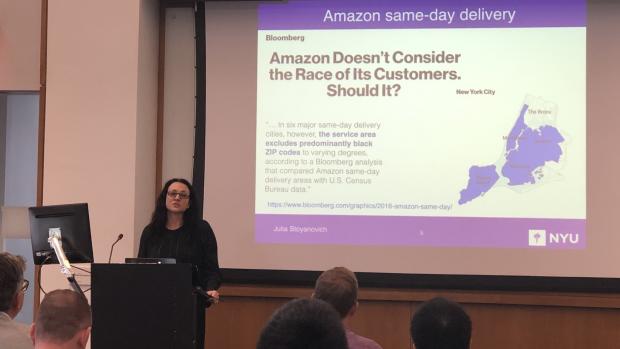Data technology could use some TransFAT
Professor Julia Stoyanovich discusses incorporating Translating Fairness, Accountability, and Transparency (TransFAT) into data science

Professor Julia Stoyanovich analyzing online discrimination as one of the effects of data malpractice.
Professor Julia Stoyanovich of the Computer Science and Engineering Department dissected the dangers of data science technology as part of the Center for Urban Science and Progress (CUSP) seminar series. With claims in the field promising to improve people’s lifestyles, accelerate scientific growth and benefit societal change, if used irresponsibly, the same technology can reinforce inequity, limit accountability, and infringe on the privacy of individuals.
To negate the image of data science as a perpetrator of discrimination, Stoyanovich highlighted her “Data, Responsibly” project. The consortium of professors and doctoral students works to manage and analyze data ethically and in compliance with laws and regulations. Stoyanovich serves on the New York City Automated Decision Systems (ADS) Task Force, which looks at New York’s use of algorithms from the standpoint of equity and transparency.
Stoyanovich specifically argued that legal and policy considerations become central to the task of sharing and analyzing data responsibly, connecting to the increasing number of ongoing regulatory efforts in the US and elsewhere, such as Local Law 49, which was passed in 2017 and established the ADS Task Force the following year.
Teaching these skills to the next generation of data scientists was crucial to Stoyanovich, so she developed a course on Responsible Data Science at the Center for Data Science at NYU, a technical course that tackles the problems of ethics, data quality, algorithmic fairness and diversity, transparency and accountability, and data protection.
Stoyanovich concluded with asserting that we need novel technological solutions to identify and rectify irresponsible data analysis practices, but also claiming that data scientists alone cannot solve the problem — policymakers, educators and citizens must all play a role as well.
“With this great power of technology comes the greater responsibility of maintaining the humanity within data science,” Stoyanovich said.
Anna De La Rosa
BS, Media, Culture, and Communication
Class of 2021




